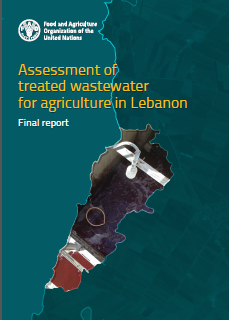Assessment of Treated Wastewater for Agriculture in Lebanon
 |
تقييم مياه الصرف الصحي المعالجة والمخصصة
report Jan 2016 ; 42 pages
Aut. Motasem Abu Khalaf &
Ed. FAO - Rome FAO - Baabda
Downloadable format: PdF
Downloadable from the publisher
Abstract:
The purpose of this study is to provide an updated and comprehensive database of information on the status and progresses made on the use of treated wastewater in Lebanon, to highlight data gaps and inconsistencies, and assess the potentialities of TWW using a case study approach in Caza (Province) through a GIS multilayer analysis. The study is based on the work of the FAO project 'Coping with water scarcity - the role of agriculture – Phase III', active in Lebanon since 2011, which seeks to strengthen the safe use of treated wastewater in agriculture and deals with the agricultural component of water scarcity. The study also presents a tool to support the Government of Lebanon to meet its stated objectives for agricultural water management and to develop new policies on the use of TWW. It will further contribute to the achievement of a number of existing national strategies relating to water, agriculture, environmental management and desertification. Contents:
Introduction
I- Water and agriculture
Use of trated wastewater in agriculture
The wastewater strategy
II- Purpose of this report
III- Methodology
IV- Data collection and data availability
V- Results
Analysis of the dataset on TWW
GIS analysis
Caza (Province) Rachaiya study area
Data quality assessment
Conclusions
Target Audience:
Keywords: |
irrigation (CI) (DT) (ET) (ope) , wastewater reuse (CI) (DT) (ET) (ope) |
Country: |
Publishers/Broadcasters: |
|
FAO
-
Food and Agriculture Organization - Rome - Italy |
FAO
-
Food and Agriculture Organization of the United Nations - Baabda - Lebanon |
If there is a broken link, we will be pleased to receive a message: communication@pseau.org